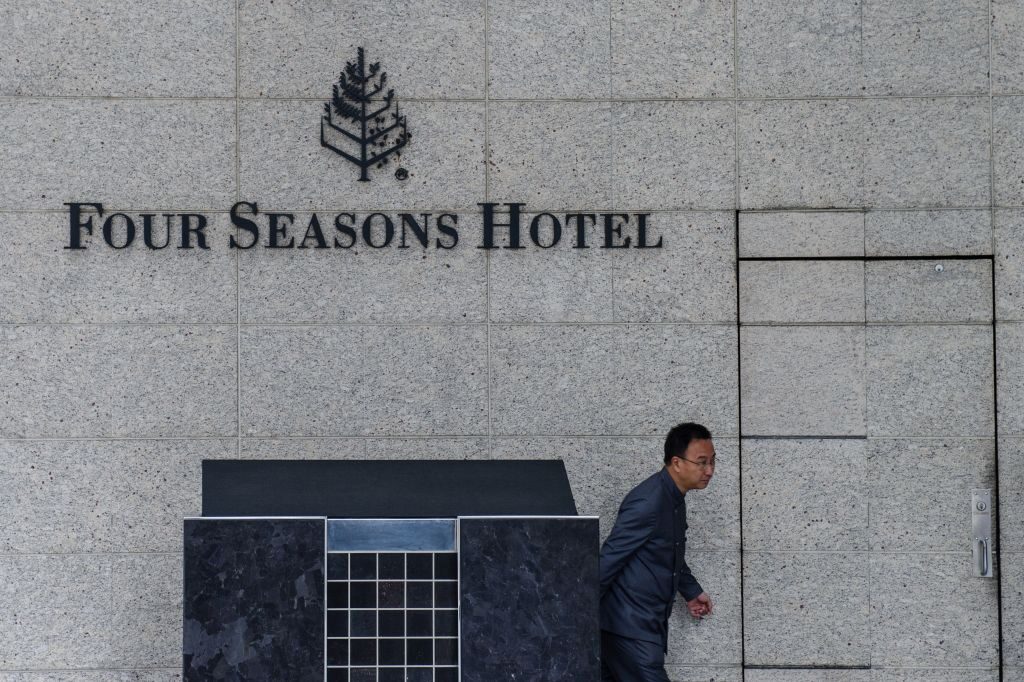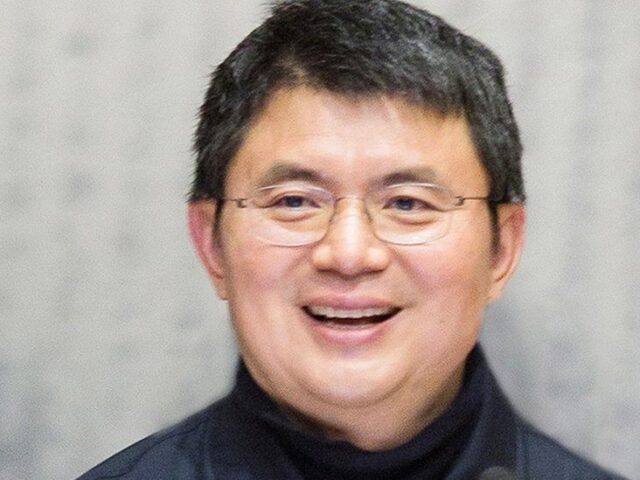Billionaire Xiao Jianhua, born in China but a citizen of Canada, was violently abducted by Communist Chinese agents from a Hong Kong hotel in 2017. The Chinese tyranny held him incommunicado for five years, denying him access to Canadian consular services. In July he reappeared in a Shanghai courtroom, where he was quickly declared guilty of corruption, and on Friday he was sentenced to 13 years in prison.
Xiao, 50, was a child prodigy who enrolled in classes at Peking University when he was only 14 years old. His star began to rise in Communist circles when he remained loyal to the government during the student protest movement that ended with the bloody Tiananmen Square atrocity in 1989.
Xiao headed up a massive financial conglomerate called the Tomorrow Group that served the needs of China’s rich and powerful, effectively becoming the favorite banker of Communist millionaires. He built a personal fortune that peaked at almost $6 billion, while his Tomorrow Group spawned numerous insurance and trust firms, some of which were controlled by shell companies – a deception that helped to keep the Communist Party’s serfs from realizing just how rich their socialist leadership was becoming.
Something went badly wrong in Xiao’s relationship with the Chinese Communist Party and dictator Xi Jinping back in 2017. The ostensible problem was that China’s government grew nervous about Xiao’s swashbuckling financial exploits, and feared the Tomorrow Group was so huge that it could crash the entire Chinese financial sector if Xiao ran it aground.

File/A Chinese billionaire has been abducted in Hong Kong by mainland agents, according to reports on January 31, triggering more concerns over security in the city after the disappearance of five booksellers. Financier Xiao Jianhua, founder of Beijing-based Tomorrow Group, was staying long-term at Hong Kong’s luxury Four Seasons hotel, according to reports in overseas Chinese-language media. (ANTHONY WALLACE/AFP via Getty Images)
More cynical observers came to wonder if Xiao knew too much about the financial dealings of the Communist Party elite, so Xi decided to silence him.
“Xiao was half-fixer, half-potential scapegoat, appeasing high officials and working political connections on behalf of the wealthy,” Foreign Policy (FP) observed in July.
“Connected billionaires like Xiao were in danger when President Xi Jinping’s purges began in 2013, because they had ties to multiple top figures. These ties rendered them vulnerable as Xi carved his way through his political opposition. Xiao’s clients included Xi’s relatives. But that didn’t protect him – if anything, it put him in more danger,” FP observed.
Xi and his family are fantastically wealthy, but the dictator likes to posture as a hard-working man of humble origins who rose to lead the Communist Party by the sweat of his brow. Xiao knew far too much about how Xi’s family finances actually worked. He probably also has a dangerously acute understanding of just how much debt China’s rulers are hiding as the economy wobbles.
Xiao was smart enough to realize he was in danger, especially after other billionaires began vanishing without a trace, only to reappear at corruption trials months or years later. He had too much money on the line in China to break away completely, so he decided to establish a base of operations in semi-autonomous Hong Kong, living for years in a luxury suite at the Four Seasons hotel with an all-female squad of bodyguards. He gambled that Hong Kong’s Western-style legal system and guaranteed autonomy would protect him from Xi’s purges – and he lost.
On January 27, 2017, a squad of a dozen Chinese Communist agents stuffed Xiao into a wheelchair, threw a blanket over him, and rolled him out of the Four Seasons. His kidnappers evidently managed to evade Hong Kong’s border police by loading him into a boat and bringing him to mainland China.
That was the last the world knew of the billionaire’s whereabouts for years. The regime in Beijing peddled a string of outrageous lies to conceal his fate. The Communist thugs who kidnapped him told the hotel staff they were doctors whisking him away for emergency medical treatment. The Tomorrow Group was forced to buy a flashy front-page ad in a Hong Kong newspaper that said Xiao was “recuperating abroad” after an illness. A missing persons report filed by Xiao’s family in Hong Kong mysteriously disappeared.
The Chinese government did not admit Xiao was on the mainland until 2020, at which point Communist officials claimed he was voluntarily working with them to “restructure” his financial empire. When the regime finally trotted him into a courtroom, the details of the charges were kept secret until the verdict was pronounced.
China’s agents were unquestionably operating in defiance of Hong Kong law when they gave Xiao the black-bag treatment. His kidnapping was one of the major events that would ultimately lead to Hong Kong’s 2019 protest movement, which was sparked by a proposed extradition law that would make it even easier for Beijing to grab Hong Kong residents. China crushed the protests in 2020 by imposing an illegal and blatantly tyrannical “national security law” to make all dissent illegal, sweeping away the last shreds of Hong Kong’s autonomy.
Xiao reappeared in a Shanghai courtroom last month, charged with paying millions of dollars in bribes to Chinese officials over the past twenty years and abusing almost $100 billion in government funds and property. The court said Xiao and the Tomorrow Group “severely violated financial management order” and “hurt state financial security” with their alleged misdeeds.
On Friday, the Shanghai court sentenced Xiao to 13 years in prison and fined the Tomorrow Group roughly $8 billion. Xiao was also socked with a $1 million personal fine.
The court said Xiao could have been slapped with even heavier fines and longer imprisonment , but since he “has taken commendable actions” to aid the investigation and make restitution, “he was given a mitigated punishment in accordance with the law.”
Xiao was denied access to Canadian consular services during his trial, despite repeated requests from Canadian diplomats for seats in the courtroom. The Chinese court system frequently refuses to recognize dual citizenship.
Chinese Foreign Ministry spokesman Wang Wenbin on Friday discarded Canada’s consular treaties with China as meaningless in the Xiao case.
“China does not recognize Chinese citizens with dual nationality. Xiao Jianhua has Chinese nationality. He does not enjoy the right to consular protection of other countries,” Wang insisted.
Foreign Policy suspected Xiao’s sudden reappearance after years of black-site captivity might be the equivalent of an imperial Roman triumph, with Xi hauling his old banker into court for a high-profile trial to consolidate his power ahead of the Chinese Communist Party Congress in November, at which he will secure an unprecedented third term.
“But it may also be that the negotiations around Xiao simply took an unusually long time to work out because of just how connected he was. He went into detention, however unwillingly, with much more leverage than the average victim of the system, thanks to his knowledge of where the money is and his potential to testify against others,” FP added, anticipating a relatively comfortable incarceration for Xiao because he is “not in the torturable class.”
Deutsche Welle suspected China’s appetite for humiliating the government of Canadian Prime Minister Justin Trudeau could be another factor in Xiao’s sudden trial and sentencing, pointing out that “Chinese-Canadian relations have been strained” ever since Canada arrested Communist Party royalty and Huawei executive Meng Wanzhou for extradition to the United States. China took several Canadians hostage in response, and was able to pressure Canada into releasing Meng last year.

COMMENTS
Please let us know if you're having issues with commenting.